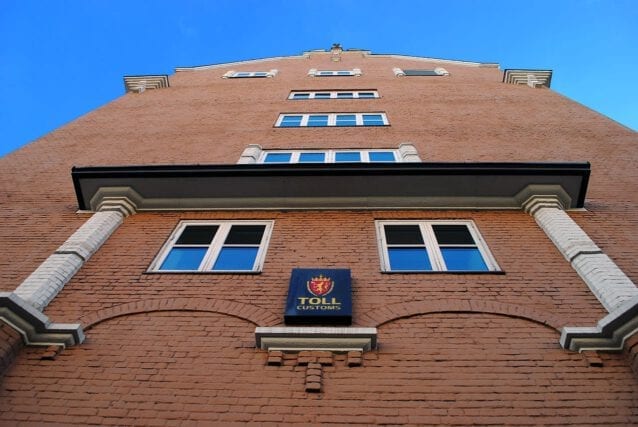More and more Poles live by the fjords. Many of us travel frequently to our homeland and, quite obviously, we transport various goods across the border. Therefore, it is worth being aware of what customs regulations are in force in Norway. Knowing the law will not hurt anyone, what's more - it can only help.
Red or green gate?
The first dilemma you will face is choosing the right transition. The whole procedure will be much faster if you choose the green gate. By passing through it, you declare that you only have goods free from customs duty and items that do not require a transport permit. Choosing the red passage is also a declaration that you have items and goods subject to customs duty, excise duty and / or a special permit.
[wc_button type = "primary" url = "[wc_button type =" primary "url =" [wc_button type = "primary" url = "[wc_button type =" primary "url =" https://web.facebook.com/ radionorwegia / "title =" Like us on Facebook! " target = "blank" url_rel = "" icon_left = "facebook-f" icon_right = "" position = "center" class = ""] Like us on Facebook! [/ wc_button]
IMPORTANT! Do not draw the passage - if you do not know which one you should go to, ask the Customs Service (norw. Customs). This way, you will avoid severe penalties and even be accused of smuggling!
Goods exempt from customs duties
Customs regulations in Norway clearly specify which goods are not subject to customs duty and are exempt from excise duty. These are primarily:
- personal or gift items. At the same time, these are not goods that we intend to resell at a profit,
- in addition, these items must be brought in person and in hand luggage. It must be possible to present them to the Customs Service during the inspection.
It may happen that your luggage is unfortunately lost. In this case, you have to go to the red passage in person and inform what items were in the missing bags. This applies to both hand luggage and personal luggage.
Customs regulations in Norway - when will you not pay?
However, if you are transporting items that are normally dutiable, there is a chance that you will still not be required to pay for them. Customs regulations stipulate that each person is exempt from customs duties and excise duty, as long as they have stayed abroad for less than 24 hours, and the goods they bring in are not worth more than PLN 3. NOK. If your stay abroad exceeded 24 hours, then the value limit increases to 6. NOK. This also applies to the following product groups:
- 1 liter of spirit drink from 22% to a maximum of 60%,
- 1,5 liters of wine from 2,5% to a maximum of 22%,
- 2 l of beer from 2,5% and stronger or ready-made drinks or cider (those in the range from 2,5% to 4,7%),
- 200 cigarettes,
- 200 pieces of cigarette papers,
- 250 grams of other tobacco products.
A question of age
It is also worth knowing that customs regulations in Norway prohibits the import of alcoholic beverages and cigarettes to persons under 18 years of age. Even stricter limits apply to spirits whose alcohol content exceeds 22%. Only people over 20 years of age will be able to take such products with them.
Also read: VAT in Norway - what do you need to know? >>>
As a rule, children under 12 are also not allowed to transport food. However, it is possible to apply exemption from customs duties and excise duty in this age group. However, this applies only to such goods as: mineral water, chocolate products and generally understood sweets.
Customs regulations in Norway regarding weight
Detailed customs regulations in Norway have also been introduced regarding the weight of the transported products. The law allows you to have a total of 10 kg of meat, meat products, cheese and other dairy products with you, free of charge. Interestingly - foods intended for dogs and cats are not included in the weight limit.
However, the above regulations do not apply to food products coming from outside the EEA countries. Such products are subject to mandatory veterinary inspection at the border. They must also have appropriate veterinary certificates. Only after these conditions are met, you have the right to bring them into the territory of the Kingdom.
What can you not carry across the border?
Customs regulations in Norway also regulate a group of products that you cannot bring into the territory of the Kingdom. Applies to:
- drugs, poisons and medicines (small amounts of medicine for personal use may be imported)
- products alcoholic beverages with alcohol content over 60 percent,
- weapons and ammunition,
- fireworks,
- potatoes,
- mammals, birds and exotic animals,
- plants / plant parts intended for cultivation,
- meat, meat products, milk and dairy products from countries outside the EEA.
You must have the appropriate permit for the above groups of goods to cross the Norwegian border!
Customs regulations in Norway - what else?
It is worth knowing that customs regulations in Norway regulate in detail the issue of transporting agricultural products. These restrictions are aimed at preventing the spread of crop diseases. Provides detailed information on this subject Norwegian Inspection Food Safety (Norwegian matilsynet). Special regulations also apply to the transport of animals, cars registered in other countries, antiques and monuments.



